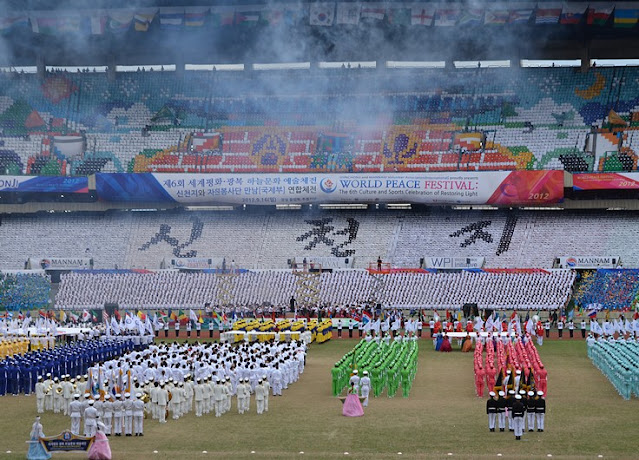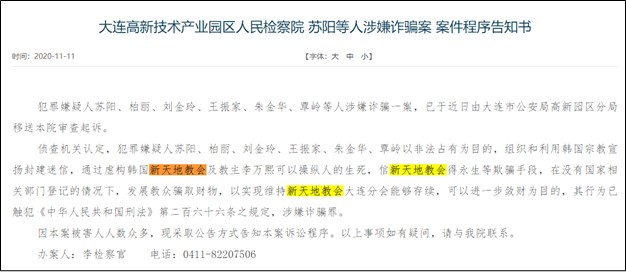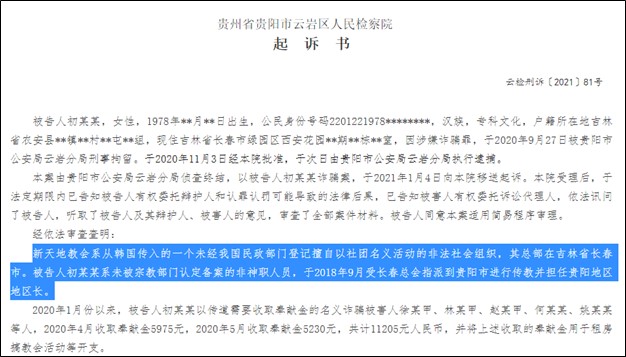 |
| On September 16, 2012, Shincheonji Church hosted the 6th Shincheonji National Olympiad in Olympic Stadium in Seoul. Image credit: Junganghansik / CC BY-SA 3.0 |
The Chinese government has long been vigilant of burgeoning Christian groups from South Korea. Of the 12 Christian groups identified as cult organizations in a circular issued by the Ministry of Public Security in 2000, three are from South Korea: The Unification Church, World Elijah Evangelical Mission, and Dami Mission. However, many more South Korean Christian groups have been targeted in religious crackdowns across China. Following its exploration of the case of Cho Young-joo and his Good News Mission, Dui Hua has found ample evidence of a clampdown on the Shincheonji Church of Jesus (新天地教会) by the Chinese government.
Literally translated as New Heaven and New Earth Church, Shincheonji was singled out for fierce criticism in South Korea in early 2020 while the country was battling its COVID-19 outbreak. The controversy began with a Shincheonji congregant nicknamed Patient 31 who attended several church events in Daegu despite having COVID-19 symptoms. In March 2020, the city became the largest epicenter of the pandemic outside China, with a cluster of infections reportedly linked to this secretive Protestant group. Sincheonji’s founder Lee Man-hee was charged with and acquitted of obstructing efforts to stamp out the pandemic by deliberately withholding information about its membership from health authorities trying to conduct contact tracing. However, Lee was convicted of embezzling billions of Korean won and received a suspended prison sentence.
Before the pandemic made Shincheonji a target of public scorn, Dui Hua’s research into government records found that China had long perceived the group to be a “cult organization” and source of religious infiltration and heresy. While some Shincheonji activity was identified in China as early as 1993, Chinese government sources say that “religious infiltration” in an organized manner in northeast provinces and eastern coastal regions began around 2010. A state-run media article in 2018 wrote that, “Under the banner of Christianity and being a public welfare organization,” Shincheonji deifies its founder Lee Man-hee and fabricates heresy about the “immortal body.” The article went on to say that by illegally collecting personal information, Shincheonji “steals state secrets, amasses vast fortunes, and endangers society.”
 |
| A parked car with signs protesting Shincheonji Church in March 2020. Image credit: MatthieuRicard / CC0 via Wikimedia Commons |
Dui Hua’s research into local government yearbooks found about two dozen instances of religious clampdowns targeting Shincheonji in Beijing, Heilongjiang, Liaoning, Fuzhou, Jiangsu, Zhejiang, Henan, Hubei, Hebei, and Shanxi before the pandemic. In 2018, local governments across China began banning Shincheonji in their anti-cult campaigns. The largest raid occurred in November 2018 in Dalian, Liaoning, where the church had grown to 2,000 members. Dozens of core members were admonished after police confiscated all their religious items. In the same year, police in Zhangwan District, Hubei, found that Shincheonji had been actively preaching among students during the summer holiday, and authorities detained 40 people in 11 cult cases involving Shincheonji as well as Falun Gong and Almighty God.
Shincheonji members in South Korea and China were in frequent communication with each other. On February 29, 2020, South Korea’s Ministry of Justice said that a total of 3,600 Shincheonji followers entered South Korea from China between July 2019 and February 27, 2020. Of them, 42 members had entered the country from Wuhan during this period.
In February 2020, the South China Morning Post (SCMP) reported that Shincheonji had a membership of 20,000 people across China. There were about 200 members in Wuhan when rumors surfaced in late 2019 about an unknown virus in the Chinese city which would become the epicenter of the epidemic. Members continued to hold meetings until December 2019 but stopped after they realized that their congregants had been infected with COVID-19. After December 2019, Shinchoenji moved online, continuing to share sermons and teachings virtually. Most members had returned home at the start of the Lunar New Year holiday in late January 2020.
The same SCMP report also quoted a former Shincheonji missionary in Shanghai as saying that the church used to hold meetings every Wednesday and Sunday, attracting 300-400 people at a time. Despite multiple raids by police, church members continued to meet in smaller groups of eight to 10 people. The church’s secretive nature made it hard for the authorities to eradicate its activities, said the missionary.
 |
| The first known criminal case involving six members of Shincheonji in Dalian, Liaoning. Image credit: www.12309.gov.cn |
Dui Hua’s research found the two criminal cases involving Shincheongji in China from the procuratorate website. In both cases, the suspects were accused of fraud. A notice posted on November 11, 2020 indicated that six Shincheonji members were detained for “organizing and using a Korean religion to promote feudal superstition” in Dalian, Liaoning, by falsely saying “that Shincheonji and its founder Lee Man-hee can manipulate one’s life and death.” The case was transferred to Dalian High-Tech Industrial Zone Procuratorate for review, but no further information is publicly available.
 |
| A female Shincheonji member in Guiyang, Guizhou, was indicted for fraud on February 3, 2021. Image credit: www.12309.gov.cn |
The second case involves one female criminal suspect surnamed Chu, who was detained in Guiyang, Guizhou, on September 27, 2020 and arrested 37 days later on November 3. According to the indictment issued on February 3, 2021, Chu was appointed by Shincheonji’s Chinese headquarters in Changchun to proselytize in Guiyang, but her status as a cleric had not been recognized by China’s religious bureau. Chu was accused of receiving 11,205-yuan in donations from church members in the two months since April 2020. The prosecutor recommended that the court give Chu a lenient prison sentence of six months because Chu admitted her guilt.
China is not alone in discrediting minority religious groups like Shincheonji. Mainstream Protestant denominations in South Korea call it a “cult” because of its secretive nature and unconventional beliefs. Lee Man-hee claimed that he is the second coming of Jesus Christ uniquely capable of deciphering the Bible’s Book of Revelation. Despite having been acquitted over the COVID case surge in South Korea, Shincheonji continues to come under fire for spreading the coronavirus. Chinese news media sources have reinforced the notion that Shincheonji is a virus spreader and a fraudulent cult, just as some in South Korea and further abroad continue to regard the group with fear, resentment, and confusion.
